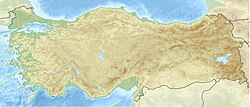Erzincan in Turkey, then part of the Ottoman Empire, was struck by a major earthquake on 18 July 1784. It caused widespread damage between Erzincan and Muş. It had an estimated magnitude of 7.6 Ms. More than 90% of the houses in Erzincan collapsed and at least 5,000 people died,[3] with some reports of more than 10,000 deaths.[4] A 150 km long zone of surface rupture was observed.[1] It ruptured the Yedisu segment at the eastern end of the North Anatolian Fault, which has not ruptured since then and is now regarded as a seismic gap. In 2013 it was estimated that about 2.67 m of displacement deficit has accumulated on this fault segment since 1784, sufficient to drive an earthquake of up to Mw7.5.[2]
| Local date | 18 July 1784 |
|---|---|
| Magnitude | 7.6 Ms[1] |
| Epicenter | 39°30′N 40°12′E / 39.5°N 40.2°E[1] |
| Fault | North Anatolian Fault[2] |
| Type | Strike-slip[2] |
| Areas affected | Erzincan Ottoman Empire |
| Casualties | 5,000[3]–>10,000 dead[4] |
References
edit- ^ a b c Ambraseys, N.N.; Jackson, J.A. (1998). "Faulting associated with historical and recent earthquakes in the Eastern Mediterranean region". Geophysical Journal International. 133 (2): 390–406. Bibcode:1998GeoJI.133..390A. doi:10.1046/j.1365-246X.1998.00508.x.
- ^ a b c Aktug, B.; Dikmen, U.; Dogru, A.; Ozener, H. (2013). "Seismicity and strain accumulation around Karliova Triple Junction (Turkey)". Journal of Geodynamics. 67: 21–29. Bibcode:2013JGeo...67...21A. doi:10.1016/j.jog.2012.04.008.
- ^ a b National Geophysical Data Center (1972). "Significant Earthquake Information". National Geophysical Data Center / World Data Service (NGDC/WDS): NCEI/WDS Global Significant Earthquake Database. NOAA National Centers for Environmental Information. doi:10.7289/V5TD9V7K. Retrieved 20 November 2021.
{{cite journal}}: Cite journal requires|journal=(help) - ^ a b Gündüz, A.; Türkmen, S.; Eryiğit, U.; Karaca, Y.; Aydın, M. "Is Turkey an Earthquake Country?" (PDF). The Journal of Academic Emergency Medicine. 12: 33–37.
